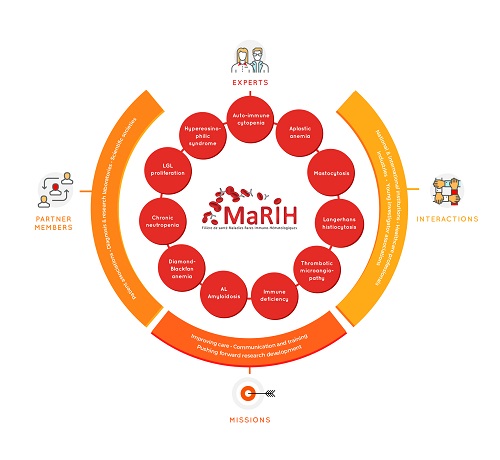
Contributions
Abstract: PB2083
Type: Publication Only
Background
Health networks focused on rare diseases were created following a call for proposals from the French Ministry of Health in the summer of 2013. The main objective of these networks is to facilitate and to coordinate the actions being implemented by all actors involved in treating rare diseases. Of the 23 national networks identified in 2014 in France, the network for rare immunohematological rare diseases “MaRIH” brings together national reference centres and recognized centres of expertise as well as patients' associations involved in treating those pathologies, on behalf of scientific medical societies.
Aims
Improving care, communication and training, pushing forward research development and epidemiological surveillance.
Methods
MaRIH brings together people involved in those medical pathologies: 8 national reference centres, 5 centres of expertise, more than 50 diagnosis and/or research laboratories, 9 patients' associations on behalf of 7 scientific societies.
Results
The main missions of this network are to improve the care, the research and to educate professionals, patients as well to disseminate more information to the general public on these rare diseases. Improving care : Thanks to its visibility (events, leaflets, website), MaRIH should help primary care doctors to more quickly diagnose and therefore provide faster and appropriate treatment based on best practice recommendations at the national level (PNDS) as well as international guidelines. The network will also be setting up new multidisciplinary meetings for specific immunological and hematological rare disorders through MaRIH centres so physicians in France or in other countries can have easily an expert opinion for their patients. At the same time, improving the child-adult transition was identified by the steering committee as a top priority. Communication and training : MaRIH is involved in organizing many multidisciplinary events in France to improve the visibility of the centres and to provide education on these rare diseases. The 1st annual conference of the network took place on June 25th 2015 and the third one is planned on June 1rst 2017 in Paris. Moreover, a patient's day meeting was organised on January 30th 2016 in Paris to inform on the update status of research on their disease as well as to help patients in daily common problems (sport, psychology, transfusion…). Pushing forward research development and epidemiological surveillance: the network has appointed a research project manager for its scientific and strategic committee to support, provide stability for and add value to research centre activities. The research project manager watch out for calls for tender, set-up of new registers and continually monitor the regulations for retrospective and prospective studies, both in France and at the international level. Furthermore, MaRIH supported successfully the application of several of its members for European reference networks.

Conclusion
The creation of these new networks allows strengthening the links between the various actors involved in the field to improve care and answer transversal questions.
Session topic: 31. Other Non-malignant hematopoietic disorders
Keyword(s): Inherited disease, Immunodeficiency, Diagnosis, Autoimmunity
Abstract: PB2083
Type: Publication Only
Background
Health networks focused on rare diseases were created following a call for proposals from the French Ministry of Health in the summer of 2013. The main objective of these networks is to facilitate and to coordinate the actions being implemented by all actors involved in treating rare diseases. Of the 23 national networks identified in 2014 in France, the network for rare immunohematological rare diseases “MaRIH” brings together national reference centres and recognized centres of expertise as well as patients' associations involved in treating those pathologies, on behalf of scientific medical societies.
Aims
Improving care, communication and training, pushing forward research development and epidemiological surveillance.
Methods
MaRIH brings together people involved in those medical pathologies: 8 national reference centres, 5 centres of expertise, more than 50 diagnosis and/or research laboratories, 9 patients' associations on behalf of 7 scientific societies.
Results
The main missions of this network are to improve the care, the research and to educate professionals, patients as well to disseminate more information to the general public on these rare diseases. Improving care : Thanks to its visibility (events, leaflets, website), MaRIH should help primary care doctors to more quickly diagnose and therefore provide faster and appropriate treatment based on best practice recommendations at the national level (PNDS) as well as international guidelines. The network will also be setting up new multidisciplinary meetings for specific immunological and hematological rare disorders through MaRIH centres so physicians in France or in other countries can have easily an expert opinion for their patients. At the same time, improving the child-adult transition was identified by the steering committee as a top priority. Communication and training : MaRIH is involved in organizing many multidisciplinary events in France to improve the visibility of the centres and to provide education on these rare diseases. The 1st annual conference of the network took place on June 25th 2015 and the third one is planned on June 1rst 2017 in Paris. Moreover, a patient's day meeting was organised on January 30th 2016 in Paris to inform on the update status of research on their disease as well as to help patients in daily common problems (sport, psychology, transfusion…). Pushing forward research development and epidemiological surveillance: the network has appointed a research project manager for its scientific and strategic committee to support, provide stability for and add value to research centre activities. The research project manager watch out for calls for tender, set-up of new registers and continually monitor the regulations for retrospective and prospective studies, both in France and at the international level. Furthermore, MaRIH supported successfully the application of several of its members for European reference networks.

Conclusion
The creation of these new networks allows strengthening the links between the various actors involved in the field to improve care and answer transversal questions.
Session topic: 31. Other Non-malignant hematopoietic disorders
Keyword(s): Inherited disease, Immunodeficiency, Diagnosis, Autoimmunity


